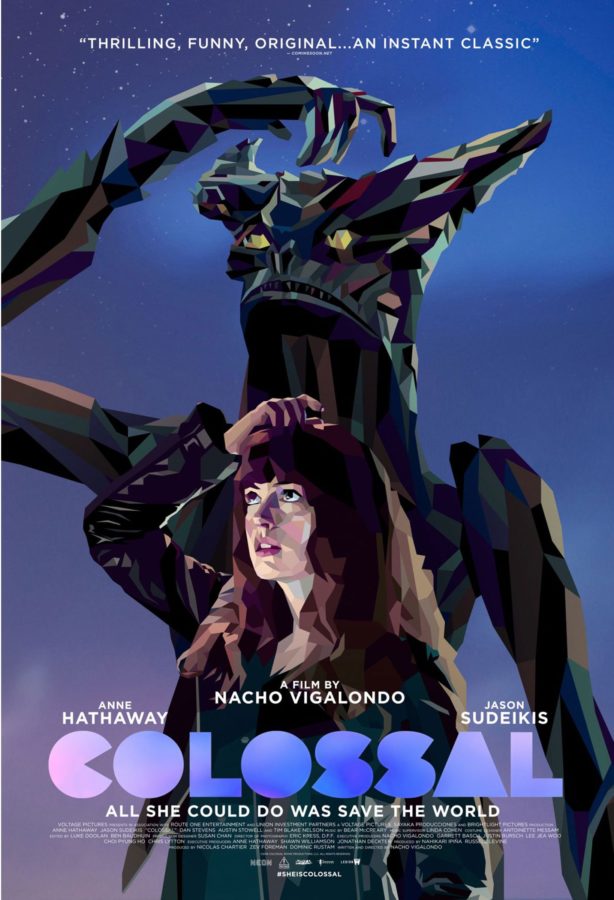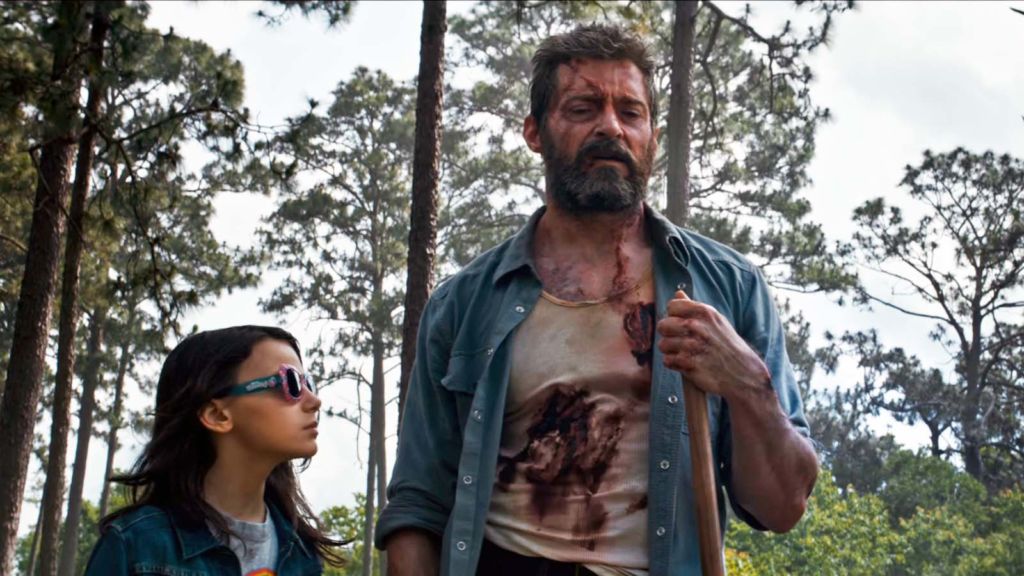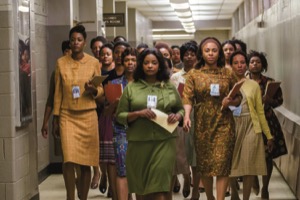Refusing a genre, ‘Colossal’ is a revelation
 The strongest of my genre expectations is that every film will exist in some sort of genre. And then, I expect that the conventions of that genre will convene, maybe with a few slips or surprises, but nothing more. When a film like Colossal comes along – a film that defies, ignores, mashes up and spits on multiple genres – I couldn’t help but be confused. Through half of it, I watched with my head tilted as if I were a puppy watching his owner practice yoga. It’s a talky indie comedy, a Korean monster movie, a feminist suspense film and an addiction parable; it’s funny, creepy, shocking and weird as hell. Clearly, the studio didn’t know what to do with it, because the trailer makes it seem like a slapstick rom com star vehicle for Anne Hathaway and Jason Sudeikis. It’s not.
The strongest of my genre expectations is that every film will exist in some sort of genre. And then, I expect that the conventions of that genre will convene, maybe with a few slips or surprises, but nothing more. When a film like Colossal comes along – a film that defies, ignores, mashes up and spits on multiple genres – I couldn’t help but be confused. Through half of it, I watched with my head tilted as if I were a puppy watching his owner practice yoga. It’s a talky indie comedy, a Korean monster movie, a feminist suspense film and an addiction parable; it’s funny, creepy, shocking and weird as hell. Clearly, the studio didn’t know what to do with it, because the trailer makes it seem like a slapstick rom com star vehicle for Anne Hathaway and Jason Sudeikis. It’s not.
Hathaway plays Gloria, an out-of-work New York writer who is drinking away her sorrows, her anxiety and her boyfriend Tim (Dan Stevens). When he kicks her out after one-too-many all-night binges, she lands in the empty house where she grew up in Maidenhead, New Jersey. While walking home with her new inflatable bed, her childhood friend Oscar (Jason Sudeikis) drives by. He now owns his father’s bar, and they rekindle their friendship while drinking till dawn with his friends Joel (Austin Stowell) and Garth (Tim Blake Nelson). Oscar eventually offers a bartending job to Gloria; he clearly has a crush on her, but she seems more interested, at least while drunk, in Joel.
Meanwhile, a several-story-tall monster is randomly appearing in Seoul for a minute at a time and causing mass destruction. Not surprisingly, everyone is horrified and mystified, and Oscar’s bar does good business because of it. But then Gloria notices that the monster has the exact same body language she does, particularly at 8:05am when she’s walking home drunk through a nearby playground. Somehow, she is that monster – for a minute a day, from 7,000 miles away, and only in that little playground. She’s confused and feels horribly guilty for being responsible for the deaths of so many (nameless, faceless) Koreans. One morning, drunk as usual, she reveals her bizarre secret to her new friends, who are flabbergasted. And then it turns out that she’s not alone in her violent out of body transnational gigantism.
Gloria’s plight veers from ridiculous to pathetic to horrifying to hilarious, with the film starting as a comedy and ending in some sort of cathartic tragedy. The tone shifts make narrative and artistic sense, but they are certainly disconcerting, especially when you realize you’re watching comedic drunkenness that is killing hundreds of people on the other side of the planet. Writer-director Nacho Vigalondo doesn’t clearly signal to the audience how they’re supposed to feel about that or about Gloria’s emotional messiness in general, aside from bemused pity and confusion. But then the awkward love square created by Gloria’s flirtation with Joel, Oscar’s crush on Gloria and Tim and Gloria’s unresolved issues mashes up against the mysterious monster embodiment. Who’s good and who’s bad and what’s right and wrong becomes clear. And by the end it should be clear to most that the whole thing is a metaphor for the struggle with alcoholism.
Hathaway has done drunk well before, earning a much-deserved Oscar nomination for Rachel Getting Married. Gloria isn’t as well written a role, but Hathaway’s ability to seamlessly transition from broad comedy to dramatic grit is perfectly utilized. Except for Sudeikis, the rest of the cast mostly exist as plot devices, which is a shame considering the skills of Stevens and Nelson. Sudeikis, however, matches Hathaway’s skills in his portrayal of a not-so-secretly despondent drunk who is the life of the party one second and its destroyer the next. Oscar’s first appearance sets him up as the lead of a rom com, but then he becomes something much less safe and much more sinister, like the film as a while. Both are a revelation.
Colossal
Written and Directed by Nacho Vigalondo
Starring Anne Hathaway, Jason Sudeikis and Dan Stevens
Rated R
Originally published in LGBT Weekly

 I received my first issue of The Uncanny X-Men in my Christmas stocking in 1985. I was 10, and it was the comic that all of my friends were reading. These boys were fixated on Wolverine, the cigar-chomping killing machine with unbreakable bones and long metal claws. He seemed to be half wild animal, half Charles Bronson in Death Wish.
I received my first issue of The Uncanny X-Men in my Christmas stocking in 1985. I was 10, and it was the comic that all of my friends were reading. These boys were fixated on Wolverine, the cigar-chomping killing machine with unbreakable bones and long metal claws. He seemed to be half wild animal, half Charles Bronson in Death Wish.
 Outside of cinephiles who have seen his Oscar-winning A Separation, Asghar Farhadi is not well known among Americans. But his name was thrust into the news over the last few weeks because of President Trump’s executive order banning travel of most anyone, but particularly Muslims, from seven majority Muslim countries. (The list does not include any majority Muslim country where Trump and his family have business dealings. Of course.) Because of the ban, Farhadi, who is from Iran, cannot travel to the United States for the Academy Awards, where his newest film The Salesman is up for Best Foreign Language Film; even if the stay of that order allows his visit, Farhadi is boycotting in protest.
Outside of cinephiles who have seen his Oscar-winning A Separation, Asghar Farhadi is not well known among Americans. But his name was thrust into the news over the last few weeks because of President Trump’s executive order banning travel of most anyone, but particularly Muslims, from seven majority Muslim countries. (The list does not include any majority Muslim country where Trump and his family have business dealings. Of course.) Because of the ban, Farhadi, who is from Iran, cannot travel to the United States for the Academy Awards, where his newest film The Salesman is up for Best Foreign Language Film; even if the stay of that order allows his visit, Farhadi is boycotting in protest. Death of Salesman seems to have no clear connection to the film’s plot until the last 20 minutes. Then, Miller’s commentary on obligation, illusion, sacrifice and failure are reimagined through Emad and Rana’s acting out of their moral duties as well as an American play. If there is any justice, publicity over Farhadi’s absence from the Academy Awards will lead American audiences to experience his art and his insight into America’s greatest drama.
Death of Salesman seems to have no clear connection to the film’s plot until the last 20 minutes. Then, Miller’s commentary on obligation, illusion, sacrifice and failure are reimagined through Emad and Rana’s acting out of their moral duties as well as an American play. If there is any justice, publicity over Farhadi’s absence from the Academy Awards will lead American audiences to experience his art and his insight into America’s greatest drama.
